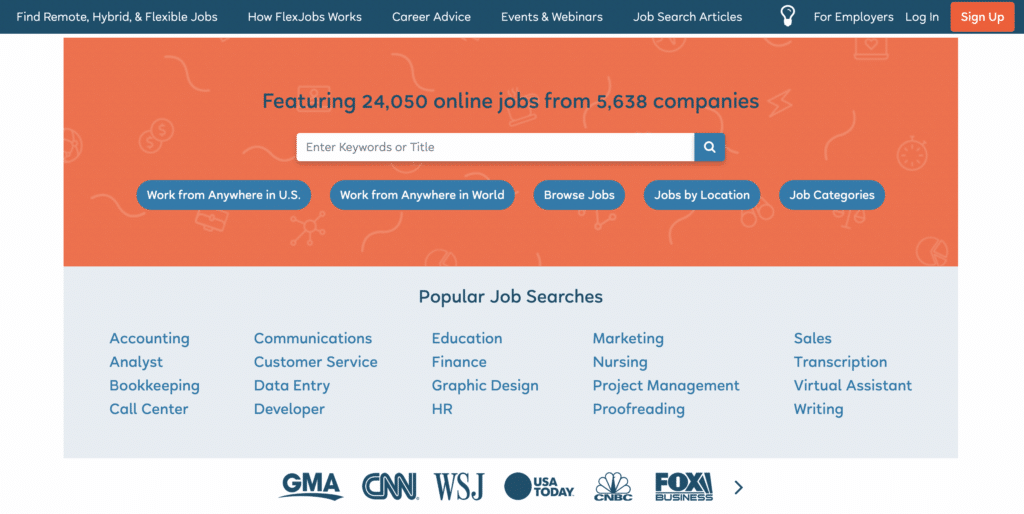Unlock Your Freedom: Learn How to Get a Remote Job In 10 Simple Steps

When you buy something through one of the links on our site, we may earn an affiliate commission.
So, you're ready to take the leap and join the growing number of people working remotely? Great decision! This is one of the best times in history to learn how to get a remote job.
From freelancing to full-time remote positions, the demand for remote workers is only increasing. Technological advancements have made it easier than ever to work from anywhere in the world.
But how do you go about your first location-independent job search? If this is your first time looking for a remote job, the process can feel overwhelming. And these 10 steps will help to demystify the process and set you up for success.
Contents
- How to Get a Remote Job: 10 Straightforward Steps
- 1. Decide What Type of Remote Job is Right for You
- 2. Take an Inventory of Your Skills and Fill Any Gaps
- 3. Spruce Up Your Resume
- 4. Update Your LinkedIn, Site, and Socials
- 5. Search for a Remote Job
- 6. Create a Plan B
- 7. Start Networking and Company Research
- 8. Prepare for Interviews
- 9. Be Persistent and Stay Focused
- 10. Transition to Working Remotely
- Final Thoughts: How To Get a Remote Job
How to Get a Remote Job: 10 Straightforward Steps
From working with hiring managers to better understanding job descriptions to researching remote companies, this guide has you covered. Follow these 10 steps to land your dream remote job.
1. Decide What Type of Remote Job is Right for You

Your first step in your job search is to clarify your preferences. Not all remote jobs are created equal, so it's important to determine the type of remote job that best suits your skills and lifestyle.
Here are a few helpful considerations to keep in mind:
- Does the current industry you work in offer remote opportunities, or will you need to pivot?
- Do you want to stay in your current line of work, or are you hoping to find an online job in a new field?
- Are you looking for a full-time position with benefits, or do you prefer more flexibility as a freelancer?
- Do you want to work remotely 100% of the time, or are you okay with a hybrid model that involves travel or going into the office from time to time?
In addition to clarifying these questions, you'll also want to decide what boundaries you need to set for yourself while working remotely.
You can decide what hours and time zones you want to work in, the level of communication you want with your team, and any other non-negotiables that are important to you.
You may want to check out our breakdown of office work vs remote work to help clarify your desires.
2. Take an Inventory of Your Skills and Fill Any Gaps

Now that you've clarified one or more remote job options that will suit you as well as your boundaries, it's time to take an inventory of your skills.
Consider what you have to offer in terms of:
- Technical skills (coding, design, social media management)
- Soft skills (communication, adaptability, time management, project management)
- Industry-specific experience
Next, ask yourself the following questions about the remote jobs you may consider:
- What skills do I already possess that are in demand for this type of job?
- Are there any gaps in my skillset that I need to improve on?
- How can I acquire or sharpen the necessary skills?
There are many online resources available for developing new skills and improving existing ones, such as online courses, webinars, and tutorials.
For a more targeted skill-building approach, head over to LinkedIn and look at profiles of professionals working in your desired remote field to get a better understanding of the skills that are in demand.
3. Spruce Up Your Resume

If you've prepared for your remote job search by clarifying your needs and refining your skill set, you're ready to put together an eye-catching resume.
Preparing a cover letter and resume for a remote job is fairly similar to the traditional job search process, but there are some key differences.
- Highlight your remote work experience if you have any.
- Emphasize your ability to work independently and remotely.
- Include any relevant digital skills, such as proficiency in remote communication tools like Slack or Zoom.
To speed up this process and add a professional touch, you learn how to use ChatGPT for resumes. This tool isn't meant to replace you but to assist in automating parts of the process such as tone, grammar, and phrasing.
If you're looking for a more curated program to support your writing, Jasper offers a suite of AI tools such as tone detectors and email subject line workflows to help you with your resume.
4. Update Your LinkedIn, Site, and Socials

Now it's time for you to share your skills and accomplishments on social media platforms. These online profiles are extremely important as it's often the first place recruiters will look to learn more about you.
Here are a few housekeeping items to keep in mind as you update your online presence:
- Use high-quality photos for your profile picture and background images.
- Keep your bios consistent across all platforms, highlighting your skills and experiences.
- Share content that demonstrates your expertise and interests. For example, if you're looking for work-from-home transcription jobs, share any examples of transcription work you've done or articles related to the field.
Having a website is also popular in remote work culture and shows your potential employer that you take your work seriously and have a professional online presence. This is especially true for those looking for contract remote work.
A site like Squarespace or WordPress is a great option for creating a professional online portfolio. Here's a list of the best Squarespace templates that can help you set up your website in no time.
5. Search for a Remote Job

Once you have your website and socials aligned with your remote job search, it's time to start looking for remote job opportunities.
You can find remote positions on a variety of platforms, from major job search sites such as Indeed and Glassdoor.
There are usually filters for remote job postings on these traditional job boards to help you filter out in-person job options. Take things a step further by saving your search and opting into notification email so you can receive new remote job listings straight to your inbox.

You can also find jobs specifically for remote workers on the FlexJobs remote job board. For a small monthly fee, you can access thousands of pre-screened remote job opportunities in a variety of industries.
Here are a few additional tips for searching for remote jobs:
- Use keywords such as "remote", "work from home", or "telecommute" in your search.
- Be specific with your location if you prefer to work within a certain time zone or region.
- Network and reach out directly to companies that offer remote opportunities.
- Pay attention to the job description, requirements, and company culture to find the best fit for you.
Finally, set up a system for tracking and monitoring remote companies and opportunities you've applied to. This will help you keep organized and follow up on any remote job application leads.
6. Create a Plan B

It can be challenging to find remote jobs on a schedule that fits your immediate needs. What if the perfect remote job doesn't come along right away? How can job seekers continue to make an income while searching for that ideal remote position?
Since we can't know exactly when we'll land that remote job, it's important to have a backup plan.
Here are a few contingency plans that will keep you financially stable while remote job hunting:
- Explore freelance or contract work opportunities through websites like Upwork or Fiverr.
- Offer your services on a remote basis to local companies in your field.
- Consider dabbling in side hustles that can generate income while you search for remote job opportunities.
- Work a part-time remote job online while maintaining your in-person job as a transition.
- Look for flexible job opportunities that don't require any minimum of work
Creating multiple streams of income not only helps with financial stability but also allows for flexibility and the potential to transition into full-time remote working.
7. Start Networking and Company Research

It's important to align with a professional network when you're transitioning into the remote workforce. There are plenty of creative ways to connect with other professionals and use your communication skills to make a lasting impression.
- Join online communities and forums related to your industry and interests.
- Attend virtual networking events, conferences, and webinars.
- Utilize social media platforms such as LinkedIn and Twitter to connect with other remote workers and companies.
- Connect with a remote worker in person to directly discuss how to get a remote job
Remember that it's important to stay active in these communities and nurture these relationships over time. Don't simply connect and then move on to the next person - actively engage, share your expertise, and offer value where you can.
Networking is a long-term investment that can pay off in the form of job opportunities, referrals, and valuable advice and insights from other experienced remote workers.
8. Prepare for Interviews

If you've been lucky enough to land a remote interview, it's time to prepare for the nuts and bolts of the process. The hiring manager will most likely connect with you through LinkedIn, email, or video chat. So you'll want to be technologically prepared for all communications.
Here are a few things you can do to make sure everything goes smoothly:
- Test your internet connection and make sure your equipment is working properly.
- Find a quiet, well-lit space for the interview.
- Double-check the timezone of the interviewer and make sure you have it correctly scheduled in your calendar.
- Dress professionally, even if you're not meeting in person.
- Practice common remote interview questions and have specific examples ready to share.
Remote interviews may differ from traditional in-person interviews, but it's important to treat them with the same level of professionalism and preparation.
Tip: After your interview with potential remote employers, send a thank-you email and follow up if you don't hear back within the specified timeframe.
9. Be Persistent and Stay Focused

It can take time to find the perfect remote job for you, but don't give up! The key is to stay persistent and focused on your goal of finding a remote position that aligns with your skills, interests, and needs.
If you're not seeing results, try to do the following:
- Scale your remote job applications
- Develop additional remote work skills
- Research additional remote job boards
- Directly reach out to ask if a company works remotely
- Educate yourself with helpful remote job resources such as blogs, podcasts, and online courses
Let's mention the mindset piece for remote job seekers for a moment. It's essential to remind yourself of why you want to work remotely and visualize yourself achieving your goal regularly. This will help you to weather the highs and lows of landing your first remote job.
10. Transition to Working Remotely

So you've finally landed a remote role and are ready to get started. Now it's time for you to curate your remote environment so that you can be as productive and successful as possible.
- Consider setting up a designated workspace that is free from distractions.
- Create a schedule and stick to it with a tool like Toggl, prioritizing tasks that align with your job responsibilities.
- Communicate regularly with your team and manager to stay connected and updated on projects.
- Take breaks and practice self-care routines to prevent burnout.
There will likely be onboarding and training procedures for new job candidates, so make sure to familiarize yourself with the processes and ask for clarification when needed.
Final Thoughts: How To Get a Remote Job
Learning how to get a remote job requires dedication, persistence, and a strategic approach.
It's helpful to have clear goals, diverse income streams, a strong network, and the necessary skills to excel in a remote working environment. With the right mindset and preparation, you can successfully transition into the world of remote work and enjoy its many benefits.
So keep applying, networking, learning, and honing your skills. With consistent efforts, you never know when the perfect remote opportunity may come knocking at your virtual door.
Want to learn step-by-step how I built my Niche Site Empire up to a full-time income?
Yes! I Love to Learn
Learn How I Built My Niche Site Empire to a Full-time Income
- How to Pick the Right Keywords at the START, and avoid the losers
- How to Scale and Outsource 90% of the Work, Allowing Your Empire to GROW Without You
- How to Build a Site That Gets REAL TRAFFIC FROM GOOGLE (every. single. day.)
- Subscribe to the Niche Pursuits Newsletter delivered with value 3X per week
My top recommendations
















